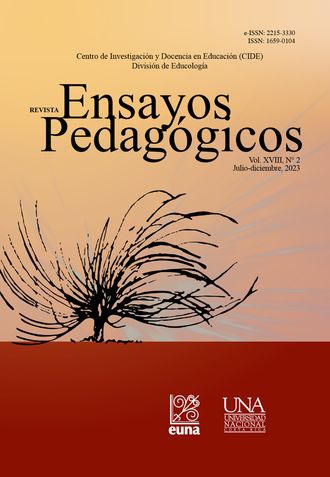Herramientas de los estudios de ciencia y tecnología para la educación sobre digitalidad y tecnologías digitales
DOI:
https://doi.org/10.15359/rep.18-2.5Palabras clave:
educación digital, estudios de ciencia y tecnología, pedagogía críticaResumen
En este ensayo, se presentan herramientas provenientes de varias ramas de los estudios de ciencia y tecnología (CTS) para la educación sobre, y con, tecnologías digitales y digitalidad. Con este fin, primero se exponen los trabajos emblemáticos de CTS que han investigado lo digital, a lo que sigue una breve reseña de las principales teorías y conceptos que para tal efecto se han aplicado. Se concluye con una síntesis de los entendimientos de CTS relevantes para el estudio de lo digital, unos elementos didácticos para su enseñanza-aprendizaje y algunas lecciones aplicables para una pedagogía crítica en esta materia.
Referencias
Abbate, J. (1999). Inventing the Internet. The MIT Press.
Bali, M. (2019). Reimagining Digital Literacies from a Feminist Perspective in a Postcolonial Context. Media and Communication, 7(2), 69-81. https://doi.org/10.17645/mac.v7i2.1935
Barad, K. (1999). Agential realism: Feminist interventions in understanding scientific practices. En M. Biagioli (ed.), The science studies reader (pp. 1-11). Routledge.
Berger, P. y Wolling, J. (2019). They Need More Than Technology-Equipped Schools: Teachers’ Practice of Fostering Students’ Digital Protective Skills. Media and Communication, 7(2), 137-147. https://doi.org/10.17645/mac.v7i2.1902
Bhatt, I. y Roock, R. (2014). Capturing the sociomateriality of digital literacy events. Research in Learning Technology, 21, 1-19. https://doi.org/10.3402/rlt.v21.21281
Bijker, W. E. (2010). How is Technology Made? That is the Question! Cambridge Journal of Economics, 34, 63-76. https://doi.org/10.1093/cje/bep068
Boczkowski, P. y Lievrouw, L. (2008). Bridging STS and Communication Studies: Scholarship on Media and Information Technologies. En E. Hackett, O. Amsterdamska, M. Lynch y J. Wajcman (eds.), The Handbook of Science and Technology Studies (pp. 949-977). The MIT Press.
Bowker, G., Baker, K., Millerand, F. y Ribes, D. (2009). Toward Information Infrastructure Studies: Ways of Knowing in a Networked Environment. En J. Hunsinger, L. Klastrup y M. Allen (eds.), International Handbook of Internet Research (pp. 97-117). Springer.
Brown, N. (2003). Hope Against Hype: Accountability in Biopasts, Presents and Futures. Science Studies, 16(2), 3-21. https://doi.org/10.23987/sts.55152
Callon, M. (1986). The Sociology of an Actor-Network: The Case of the Electric Vehicle. En M. Callon, J. Law y A. Rip (eds.), Mapping the Dynamics of Science and Technology (pp. 19-34). Macmillan.
Chaka, C. (2019). Re-imagining literacies and literacies pedagogy in the context of semio-technologies. Nordic Journal of Digital Literacy, 14(1-2), 54-69. https://doi.org/10.18261/issn.1891-943x-2019-01-02-05
Corbin, J. M. y Strauss, A. (1990). Grounded theory research: Procedures, canons and evaluative criteria. Qualitative Sociology, 13, 3-21. https://doi.org/10.1007/bf00988593
Daniels, K., Bower, K., Burnett, C., Escott, H., Hatton, A., Ehiyazaryan-White, E. y Monkhouse, J. (2019). Early years teachers and digital literacies: Navigating a kaleidoscope of discourses. Education and Information Technologies, 25, 2415-2426. https://doi.org/10.1007/s10639-019-10047-9
Deleuze, G. (1992). Postscript on the Societies of Control. October, 59, 3-7.
Dezuanni, M. (2015). The building blocks of digital media literacy: Socio-material participation and the production of media knowledge. Journal of Curriculum Studies, 47(3), 416-439. https://doi.org/10.1080/00220272.2014.966152
DiSalvo, C. (2019). Introduction / Software. En J. Vertesi y D. Ribes (eds.), DigitalSTS (pp. 365-368). Princeton University Press.
Edwards, P. (1996). The Closed World: Computers and the Politics of Discourse in Cold War America. The MIT Press.
Fenwick, T. (2015). Sociomateriality and Learning: A critical approach. En D. Scott y E. Hargreaves (eds.), The Sage Handbook of Learning (pp. 83-93). Sage Publications Ltd.
Forlano, L. (2019). Introduction / Materiality. En J. Vertesi y D. Ribes (eds.), DigitalSTS (pp. 11-15). Princeton University Press.
Foucault, M. (1977). Discipline and punish: The birth of the prison. Pantheon Books.
Franklin, S. (2015). Control: Digitality as Cultural Logic. The MIT Press.
Galloway, A. (2004). Protocol: How Control Exists after Decentralization. The MIT Press.
Garcia, A., Mirra, N., Morrel, E., Martinez, A. y Scorza, D. (2015). The Council of Youth Research: Critical Literacy and Civic Agency in the Digital Age. Reading & Writing Quarterly, 31, 151-167. https://doi.org/10.1080/10573569.2014.962203
Gillespie, T., Boczkowski, P. y Foot, K. (2014a). Introduction. En T. Gillespie, P. Boczkowski y K. Foot (eds.), Media Technologies (pp. 1-17). The MIT Press.
Gillespie, T., Boczkowski, P. y Foot, K. (Eds.). (2014b). Media Technologies: Essays on Communication, Materiality, and Society. The MIT Press.
Gourlay, L. y Oliver, M. (2013). Beyond “the social”: Digital literacies as sociomaterial practice. En R. Goodfellow y M. Lea (eds.), Literacy in the Digital University (pp. 79-94). Routledge.
Haraway, D. (1988). Situated Knowledges: The Science Question in Feminism and the Privilege of Partial Perspective. Feminist Studies, 14(3), 575-599.
Hughes, T. (1989). The Evolution of Large Technological Systems. En W. Bijker, T. Hughes y T. Pinch (eds.), The Social Construction of Technological Systems (pp. 51-82). The MIT Press.
Jackson, S. (2019). Introduction / Global Inequalities. En J. Vertesi y D. Ribes (eds.), DigitalSTS (pp. 157-159). Princeton University Press.
Jasanoff, S. (Ed.). (2004). States of Knowledge: The co-production of science and social order. Routledge.
Kline, R. y Pinch, T. (1996). Users as Agents of Technological Change: The Social Construction of the Automobile in the Rural United States. Technology and Culture, 37(4), 763-795.
Latour, B. (1999). On recalling ANT. En J. Law y J. Hassard (eds.), Actor Network Theory and After (pp. 15-25). Blackwell.
Latour, B. (2004). Why Has Critique Run out of Steam? From Matters of Fact to Matters of Concern. Critical Inquiry, 30(2), 225-248. https://doi.org/10.1086/421123
Latour, B. (2005). Reassembling the Social: An Introduction to Actor-Network-Theory. Oxford University Press Inc.
Law, J. (1999). After ANT: Complexity, naming and topology. En J. Law y J. Hassard (Eds.), Actor Network Theory and After (pp. 1-14). Blackwell.
Law, J. (2009). Actor Network Theory and Material Semiotics. En B. Turner (ed.), The New Blackwell Companion to Social Theory (pp. 141-158). Wiley-Blackwell.
Law, J. (2017). STS as Method. En U. Felt, R. Fouché, C. Miller y L. Smith-Doerr (eds.), The Handbook of Science and Technology Studies (pp. 31-57). The MIT Press.
Law, J. y Hassard, J. (Eds.). (1999). Actor Network Theory and After. Blackwell.
Loukissas, Y. (2019). Introduction / Visualizing the Social. En J. Vertesi y D. Ribes (eds.), DigitalSTS (pp. 447-450). Princeton University Press.
Lynch, M. (1991). Laboratory Space and the Technological Complex: An Investigation of Topical Contextures. Science in Context, 4(1), 51-78. https://doi.org/10.1017/S0269889700000156
Martin, A. y Grudziecki, J. (2015). DigEuLit: Concepts and Tools for Digital Literacy Development. Innovation in Teaching and Learning in Information and Computer Sciences, 5(4), 249-267. https://doi.org/10.11120/ital.2006.05040249
Mol, A. (1999). Ontological politics: A word and some questions. En J. Law y J. Hassard (eds.), Actor Network Theory and After (pp. 72-89). Blackwell.
Nichols, T. P. y Stornaiuolo, A. (2019). Assembling “Digital Literacies”: Contingent Pasts, Possible Futures. Media and Communication, 7(2), 14-24. https://doi.org/10.17645/mac.v7i2.1946
Oudshoorn, N.y Pinch, T. (2008). User-Technology Relationships: Some Recent Developments. En E. Hackett, O. Amsterdamska, M. Lynch y J. Wajcman (eds.), The Handbook of Science and Technology Studies (pp. 541-565). The MIT Press.
Pangrazio, L. (2016). Reconceptualising critical digital literacy. Discourse: Studies in the Cultural Politics of Education, 37(2), 163-174. https://doi.org/10.1080/01596306.2014.942836
Pawluczuk, A., Webster, G., Smith, C. y Hall, H. (2019). The Social Impact of Digital YouthWork: What AreWe Looking For? Media and Communication, 7(2), 56-68. https://doi.org/10.17645/mac.v7i2.1907
Pinch, T. J. y Bijker, W. E. (1984). The Social Construction of Facts and Artefacts: Or How the Sociology of Science and the Sociology of Technology Might Benefit Each Other. Social Studies of Science, 14(3), 399-441. https://doi.org/10.1177/030631284014003004
Polizzi, G. (2019). Information literacy in the digital age: Why critical digital literacy matters for democracy. En S. Goldstein (ed.), Informed Societies (pp. 1-23). Facet Publishing.
Pötzsch, H. (2019). Critical Digital Literacy: Technology in Education Beyond Issues of User Competence and Labour-Market Qualifications. tripleC, 17(2), 221-240. https://doi.org/10.31269/triplec.v17i2.1093
Rosner, D. (2019). Introduction / Gender. En J. Vertesi y D. Ribes (eds.), DigitalSTS (pp. 77-79). Princeton University Press.
Say, A. (2019). Venture Ed: Recycling Hype, Fixing Futures, and the Temporal Order of Edtech. En J. Vertesi y D. Ribes (eds.), DigitalSTS (pp. 161-177). Princeton University Press.
Sismondo, S. (2010). An Introduction to Science and Technology Studies (2.a ed.). Blackwell Publishing Ltd.
Star, S. L. (1999). The Ethnography of Infrastructure. American Behavioral Scientist, 43, 377-391. https://doi.org/10.1177/00027649921955326
Suchman, L. (1985). Plans and Situated Actions: The Problem of Human-Machine Communication. Xerox Co., Palo Alto Research Centers.
Vertesi, J. (2016). Seizing the Digital. Engaging Science, Technology, and Society, 2(1), 180-192. https://doi.org/10.17351/ests2016.75
Vertesi, J. (2019). Introduction / Infrastructure. En J. Vertesi y D. Ribes (eEds.), DigitalSTS (pp. 263-266). Princeton University Press.
Vertesi, J., y Ribes, D. (Eds.). (2019a). DigitalSTS: A Field Guide for Science & Technology Studies. Princeton University Press.
Vertesi, J. y Ribes, D. (2019b). Introduction. En J. Vertesi y D. Ribes (Eds.), DigitalSTS (pp. 1-10). Princeton University Press.
Vertesi, J., Ribes, D., Forlano, L., Loukissas, Y. y Leavitt Cohn, M. (2017). Engaging, Designing, and Making Digital Systems. En U. Felt, R. Fouché, C. Miller y L. Smith-Doerr (eds.), The Handbook of Science and Technology Studies (pp. 169-194). The MIT Press.
Walton, G. (2016). “Digital Literacy” (DL): Establishing the Boundaries and Identifying the Partners. New Review of Academic Librarianship, 22(1), 1-4. https://doi.org/10.1080/13614533.2015.1137466
Watt, D. (2019). Video Production in Elementary Teacher Education as a Critical Digital Literacy Practice. Media and Communication, 7(2), 82-99. https://doi.org/10.17645/mac.v7i2.1967
Woolgar, S. (1990). Configuring the User: The Case of Usability Trials. The Sociological Review, 38(1), 58-99. https://doi.org/10.1111/j.1467-954X.1990.tb03349.x
Wouters, P., Vann, K., Scharnhorst, A., Ratto, M., Hellsten, I., Fry, J. y Beaulieu, A. (2008). Messy Shapes of Knowledge: STS Explores Informatization, New Media, and Academic Work. En E. Hackett, O. Amsterdamska, M. Lynch y J. Wajcman (Eds.), The Handbook of Science and Technology Studies (pp. 319-351). The MIT Press.
Wyatt, S. (2008). Technological Determinism Is Dead; Long Live Technological Determinism. En E. Hackett, O. Amsterdamska, M. Lynch y J. Wajcman (eds.), The Handbook of Science and Technology Studies (pp. 165-180). The MIT Press.
Descargas
Publicado
Cómo citar
Número
Sección
Licencia
Derechos de autor 2024 Revista Ensayos Pedagógicos

Esta obra está bajo una licencia internacional Creative Commons Atribución-NoComercial-SinDerivadas 4.0.
La Revista Ensayos Pedagógicos está suscrita a la Licencia Creative Commons Atribución-NoComercial-SinDerivadas 4.0 Internacional, lo cual implica la posibilidad de que tanto las personas autoras como las personas lectoras puedan, de forma gratuita, descargar, almacenar, copiar y distribuir la versión final aprobada y publicada (post print) del artículo, siempre y cuando se realice sin fines comerciales, no se generen obras derivadas y se mencione la fuente y autoría de la obra. Asimismo, la Revista Ensayos Pedagógicos declara que toda persona autora conservará a perpetuidad los derechos de autoría de su ensayo o artículo.









